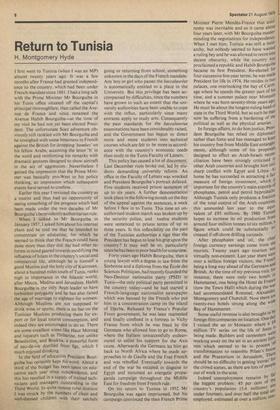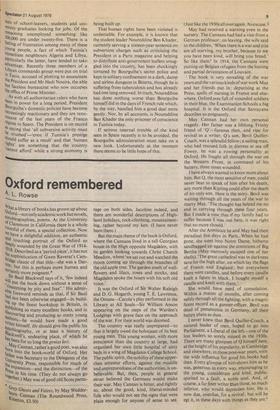Return to Tunisia
H. Montgomery Hyde
I first went to Tunisia (when I was an MP) almost twenty years ago. It was a few months after France had granted independence to the country, which had been under French mandate since 1881.1 had a long talk with the Prime Minister Mr Bourguiba in his Tunis office situated off the capital's principal thoroughfare, then called the Avenue de France and since renamed the Avenue Habib Bourguiba—at the time of my visit he had not yet been elected President. The unfortunate Suez adventure obviously still rankled with Mr Bourguiba and he inveighed with some bitterness in French against the British for dropping 'bombes' on his fellow Arabs, accenting the letter 'b' in the word and reinforcing his remarks with dramatic gestures designed to show aircraft in the act of aggression. Nevertheless I gained the impression that the Prime Minister was basically pro-West in his policy thinking, an impression which subsequent events have served to confirm.
Earlier this year 1 revisited the country as a tourist and thus had an opportunity of seeing something of the progress which had been made under the two decades of Mr Bourguiba's benevolently authoritarian rule.
When I talked to Mr Bourguiba in January 1957,1 asked him about his internal plans and he told me that he intended to concentrate on education, for which he seemed to think that the French could have done more than they did. He had other reforms in mind geared towards modifying the influence of Islam in the country's social and commercial life, although he is himself a good Muslim and the holy city of Kairouan, about a hundred miles south of Tunis, ranks high in importance in the Islamic world, after Mecca. Medina and Jerusalem. Habib Bourguiba is the only Arab leader to have forbidden polygamy and he has also raised the age of marriage to eighteen for women. Although Muslims are not supposed to drink wine or spirits, there is no bar on the Tunisian Muslims producing them for export or for local tourist consumption, and indeed they are encouraged to do so. There are some excellent wines like Haut Mornag and liqueurs such as Thibarine, not unlike Benedictine, and Boukha, a powerful form of eau-de-vie distilled from figs, which I much enjoyed drinking..
In the field of education President Hourguiba has certainly kept his word. About a third of the budget has been spent on edu cation each year since independence, and this has resulted in a supply of trained tech
nicians and managers outstanding in the Third World. In quite remote rural districts I was struck by the numbers of clean and well-dressed children with their satchels
going or returning from school, something unknown in the days of the French mandate. Any boy or girl who passes the baccalaureat is automatically entitled to a place in the University. But this privilege has been accompanied by difficulties, since the numbers have grown to such an extent that the university authorities have been unable to cope with the influx, particularly since many entrants apply to study arts. Consequently the pass standards for the haccalaureat examinations have been considerably raised, and the Government has begun to direct more and more students into technical courses which are felt to be more in accordance with the country's economic needs than study in the Tunis Faculty of Letters.
This policy has caused a lot of discontent. Last December riots broke out, led by students demanding university reform. An office in the Faculty of Letters was wrecked and President Bourguiba's portrait defaced. Five students received prison sentences of up to six years. A further demonstration took place in the following month on the day of the appeal against the sentences, a week before I flew in to Tunis. This time an unauthorised student march was broken up by the security police, and twelve students were sentenced to prison terms of up to three years. Is this inflexibility on the part of the Tunisian authorities a sign that the President has begun to lose his grip upon the country ? It may well be so, particularly since he has been in poor health for some time.
Forty years ago Habib Bourguiba, then a young lawyer with a degree in law from the Sorbonne and a diploma from the Ecole des Sciences Politiques, had recently founded the Neo-Destour nationalist party (PSD) in Tunis—the only political party permitted in the country today—and he had started a French-language nationalist newspaper which was banned by the French who put him in a concentration camp on the island of Djerba. Released by France's Popular Front government, he was later rearrested and finally confined in a fortress in Vichy France from which he was freed by the Germans who allowed him to go to Rome, where the Italians unsuccessfully endeavoured to enlist his support for the Axis cause. Afterwards the Germans let him go back to North Africa where he made approaches to de Gaulle and the Free French and was rebuffed. Eventually towards the end of the war he escaped in disguise to Egypt and mounted an energetic propaganda campaign throughout the Middle East for freedom from French rule.
On his return to Tunisia in 1952 Mr Bourguiba was again imprisoned, but his campaign convinced the then French Prime
Minister Pierre Mendes-France that autonomy was inevitable and so it came about four years later, with Mr Bourguiba masterminding the negotiations for independence. When I met him, Tunisia was still a moo' archy, but nobody seemed to have wanted a ruling bey and he was allowed to retire into decent obscurity, while the country was proclaimed a republic and Habib Bourguiha became its first President. Re-elected for four successive five-year terms, he was made President for life in 1974. He resides in two palaces, one overlooking the bay of Carthage where he spends the greater part of his time, dnd a summer palace near Monastir where he was born seventy-three years a8°., He must be about the longest-ruling head 01 state in the Third World, but as such he maY now be suffering from a hardening of the political as well as the physical arteries. In foreign affairs, to do him justice, Pres1' dent Bourguiba has relied on diploma rather than force and has managed to keeP his country free from Middle East entangle' ments, although some of his proposals designed to effect an Arab-Israeli reconciliation have been strongly criticised al other Arab countries and brought him 111td sharp conflict with Egypt and Libya. At home he has succeeded in attracting a fair measure of foreign investment, which i5 important for the country's main exports of phosphates, petrol and petrol byproducts' Although Tunisia only produces a fraction of the total output of the Arab countries. this amounted last year to the eclui' valent of £95 millions. By 1980 Tunisia hopes to increase its oil production front around four million tonnes to six milliona figure which could be substantially in' creased if off-shore drilling succeeds. After phosphates and oil, the chic' foreign currency earnings come from the tourists. Twenty years ago tourism WaS virtually non-existent. Last year there Nwelle over a million foreign visitors, the Freno, being a long way ahead of the Germans an° British. At the time of my previous visit. for instance, there were only two hotels in Hammamet, one being the Hotel de France (now the Town Hall) which during the war had accommodated Rommel, Alexander' Montgomery and Churchill. Now there are twenty-two hotels strung along the wide Bay of Hammamet. Some useful revenue is also brought in hY foreign film companies on location. One da„Y4 I visited the set in Monastir where a million TV series on the life of Jesus Ise being made. Builders and carpenters wer working away on the set in an ancient fort; ress which seemed to be in process transformation to resemble Pilate's bolls: and the Praetorium in Jerusalem., Ther, should be no difficulty in getting 'extras' fTe the crowd scenes, as there are lots of Poor out of work in the area. far Indeed unemployment remains bY e the biggest problem: 45 per cent of the country's population (5.6 millions) are country's fourteen, and over half the total °II: employed, estimated at over a million. c°" sists • of school-leavers, students and university graduates looking for jobs. Of the remaining unemployed something like 300,000 are under twenty-five. There is a feeling of frustration among many of these young people, a fact of which Tunisia's arimediate neighbours Algeria and Libya, Particularly the latter, have tended to take advantage. Recently three members of a -il3yan commando group were put on trial in Tunis, accused of plotting to assassinate the President and Mr Hedi Nouira, the able but faceless bureaucrat who now occupies the office of Prime Minister.
As with all authoritarian rulers who have teen in power for a long period, President !olourguiba's domestic policies have become in.creasingly reactionary and they are reminiscent of the last years of the Franco regime in Spain. The President is on record as saying that 'all subversive activity must he crushed'—'even if Tunisia's prestige sh. ould suffer as a result' and that 'human ,rights. are something that the country cannot afford' while a strong economy is
being built up.
That human rights have been violated is undeniable. For example, it is known that the student leader Noureddine Ben Khader, currently serving a sixteen-year sentence on subversion charges such as criticising the President in a Paris magazine and helping to distribute anti-government leaflets smuggled into the country, has been shockingly tortured by Bourguiba's secret police and kept in solitary confinement in a dark, damp and airless dungeon in Bizerta, though he is suffering from tuberculosis and has already had one lung removed. In truth, Noureddine has done nothing worse than Bourguiba himself did in the days of French rule which, by the way, handled him a good deal more gently. Nor, by all accounts, is Noureddine Ben Khader the only prisoner of conscience in Tunisia today.
If serious internal trouble of the kind seen in Spain recently is to be avoided, the Bourguiba administration must take on a new look. Unfortunately at the moment there seems to be little hope of this.



































 Previous page
Previous page